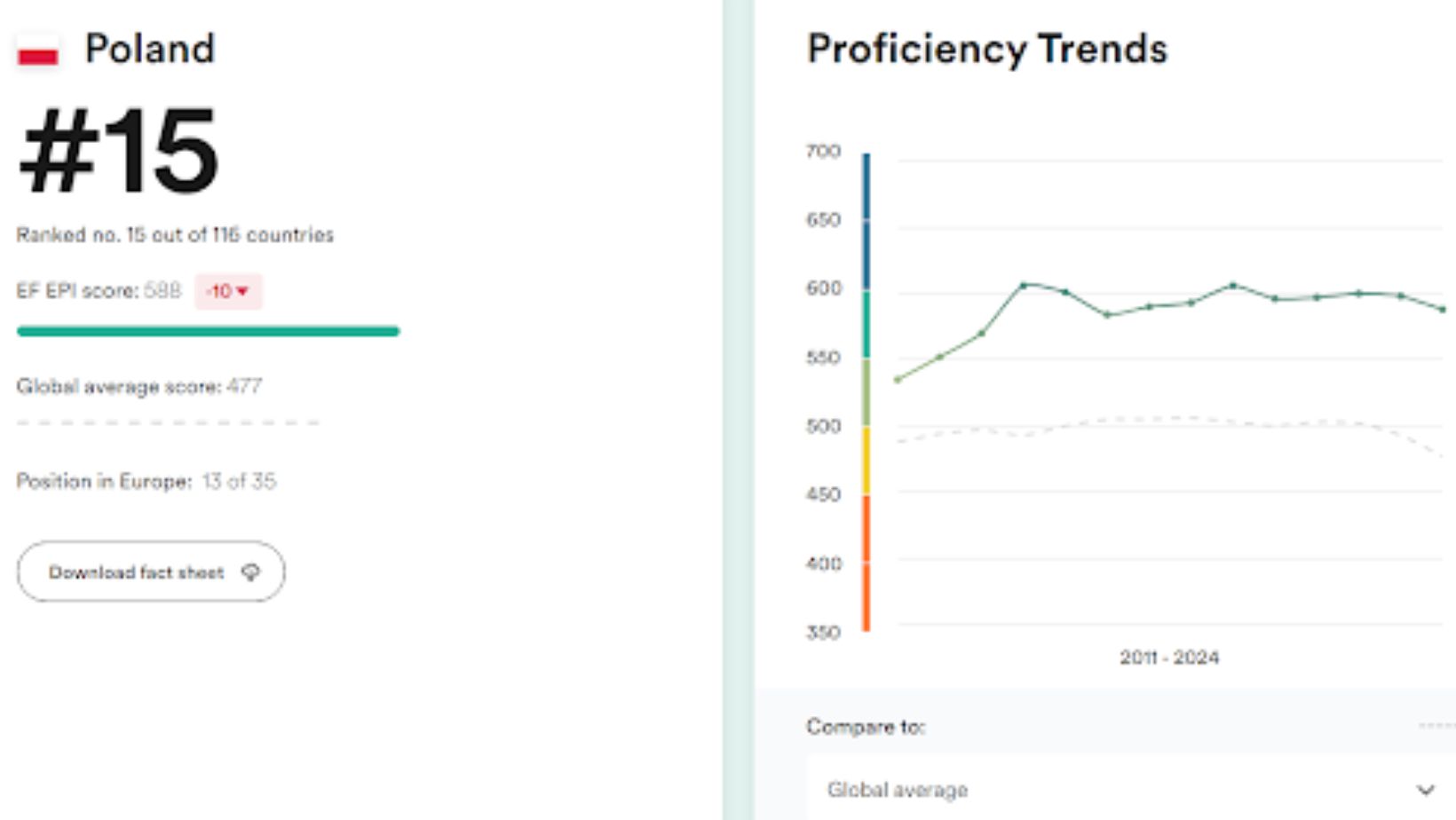Table of Contents
Toggle
Software development in Poland has undergone a remarkable transformation, with development centers in Warsaw and other major cities now hosting teams that collaborate with global clients ranging from fintech startups to Fortune 500 companies.
This shift represents a significant evolution in the global tech landscape, backed by Poland’s developers ranking in the top three countries worldwide for programming talent, according to HackerRank.
Source: https://www.hackerrank.com/
Such a combination of proven expertise and strategic advantage is making Polish developers an increasingly attractive choice for companies seeking high-quality solutions without the premium costs associated with Western markets.
What is the Polish Software Development Landscape?
Poland’s software development industry has experienced remarkable growth, with the tech sector’s revenue projected to reach $9.75 billion by 2024. This growth is built on a foundation of over 50,000 IT companies and approximately 400 international software development firms maintaining R&D centers in the country.
Global tech giants like Google, Apple, and IBM have established significant presences, further validating Poland’s position as a tech powerhouse.
The country’s robust tech ecosystem is supported by:
- A strong emphasis on STEM education, producing over 60,000 IT graduates annually
- Active government initiatives like the Digital Competence Development Program
- Strategic location within the European Union, providing access to vast markets
- Modern infrastructure supporting digital innovation and growth
Why Choose Polish Development Teams?
The decision to partner with development teams from a particular country can significantly impact a project’s success and overall business outcomes.
When it comes to Polish development teams, several distinct advantages have made them a preferred choice for companies worldwide, particularly those seeking a balance of technical excellence and cost efficiency.
Technical Excellence and Education
Polish developers stand out for their technical proficiency and problem-solving abilities. This excellence stems from the country’s rigorous education system and continuous learning culture.
The country’s technical universities, such as the Warsaw University of Technology and AGH University of Science and Technology, consistently produce highly skilled graduates who enter the workforce with strong theoretical foundations and practical skills.
Cost-Effectiveness and Value
One of the most compelling advantages of working with Polish developers is the favorable cost structure. Labor costs for software development in Poland are typically 30% lower than in the US and 20-25% lower than in Western Europe. However, this cost advantage doesn’t come at the expense of quality – Polish developers maintain high standards of work while offering significant savings.
Cultural Alignment and Communication
Polish developers stand out for their strong communication skills and cultural compatibility with Western business practices. The country consistently ranks high in English proficiency among non-native English-speaking countries, facilitating seamless collaboration with international clients.

This cultural alignment extends to work ethic, project management approaches, and business values, making Polish developers particularly attractive to Western companies.
Poland’s Tech Excellence Pillars
The success of Polish software development is built on several key pillars that create a sustainable ecosystem for technical excellence:
- Educational Foundation:
- Leading technical universities producing skilled graduates
- Strong emphasis on practical skills and innovation
- Regular collaboration between academia and industry
- Continuous professional development programs
- Innovation Centers:
- Major tech hubs in Warsaw, Krakow, and Wroclaw
- Thriving startup ecosystem
- Research and development facilities
- International company presence
The combination of these factors has created a robust environment where technical talent can flourish and deliver world-class solutions for global clients.
Strategic Partnership Considerations
While the advantages of working with Polish software developers are clear, organizations need a structured approach to evaluate and establish successful partnerships. Here’s a comprehensive framework for making informed decisions:
- Project Requirements Assessment
The first step involves clearly defining your project’s scope and technical requirements. Polish development teams excel in various areas, from mobile app development to complex enterprise solutions. Understanding your specific needs helps in identifying teams with relevant expertise and experience.
For example, if you need mobile app development, look for teams experienced with both iOS and Android platforms, and who demonstrate proficiency in technologies like React Native. Polish developers are known for their strong background in these areas, with many teams having delivered successful projects for international clients.
- Team Structure Evaluation
When selecting a Polish development partner, consider:
- Experience Level Distribution:
- Senior developers for architecture and complex problem-solving
- Mid-level developers for core functionality
- Junior developers for basic features and testing
- Technical Expertise Match:
- Programming languages and frameworks expertise
- Industry-specific knowledge
- Security and compliance understanding
- Cloud technology proficiency
- Critical Success Factors
Understanding and evaluating these key factors will help ensure a successful partnership:
- Project Planning and Timeline Alignment: Project timelines need to account for the advantages of working with Polish teams, including the favorable time zone overlap with Western Europe and the efficient development processes common in Polish software houses.
- Communication Protocols: While English proficiency is high among Polish developers, establishing clear communication channels and protocols is essential. Regular video calls, project management tools, and documentation practices should be agreed upon early.
- Budget Optimization: Polish development teams offer significant cost advantages, but it’s important to structure the engagement model correctly. Consider whether a dedicated team, project-based work, or a hybrid model best suits your needs.
- Risk Assessment
Before finalizing any partnership, evaluate potential risks and mitigation strategies:
- Intellectual Property Protection: Poland’s EU membership ensures strong IP protection laws.
- Data Security: Polish developers are well-versed in GDPR and international security standards.
- Quality Assurance: Look for teams with robust testing and quality control processes.
- Project Continuity: Ensure the team has backup resources and clear escalation procedures.
By carefully considering these strategic elements, companies can maximize the benefits of working with Polish development teams while minimizing potential risks. The key is to approach the partnership as a strategic relationship rather than just a service provider arrangement.

Polish software developers have proven themselves as reliable partners for companies worldwide, offering a unique combination of technical excellence, cost-effectiveness, and cultural alignment. As the global demand for quality software development continues to grow, Poland’s position as a premier destination for technical talent is likely to strengthen further.
Remember that success in working with Polish developers often comes down to choosing the right partner and establishing clear processes from the start. With proper planning and consideration of the factors outlined above, companies can leverage Poland’s impressive tech talent pool to achieve their software development goals efficiently and effectively.
Frequently Asked Questions
How Can Companies Optimize Time Zone Differences With Polish teams?
Poland’s time zone (CET/CEST) provides a sweet spot with 6-8 hours of overlap with the US East Coast and full workday overlap with European clients. Teams can structure their work schedules to maximize these overlapping hours for meetings and real-time collaboration.
What Are The Ideal Practices For Integrating Polish Developers With Existing In-House Teams?
Successful integration often involves initial face-to-face onboarding periods, regular virtual team-building activities, and establishing “buddy systems” where Polish developers are paired with in-house team members for smoother knowledge transfer and cultural integration.
How Should Companies Handle Project Documentation When Working With Polish Teams?
While Polish developers are typically fluent in English, maintaining detailed technical documentation in both English and Polish can enhance precision and understanding. Using standardized documentation templates and automated documentation tools can help maintain consistency.
What Local Polish Tech Events And Conferences Should International Companies Be Aware Of?
Companies should consider participating in major Polish tech events for networking and recruitment. These include the Infoshare conference in Gdańsk, the Impact CEE conference, and various hackathons organized by Polish tech communities throughout the year.
How Do Polish Labor Laws Affect Software Development Contracts?
Polish labor laws include specific provisions for tech workers, including regulations about overtime, remote work, and intellectual property rights. Understanding these regulations is crucial for structuring compliant development contracts and work arrangements.
What tech specialties are Polish development teams particularly known for?
Polish teams are increasingly recognized for expertise in blockchain development, artificial intelligence implementation, and cybersecurity solutions. There’s also a growing specialization in fintech applications and IoT development.
How Can Companies Tap Into Poland’s Tech Education Pipeline?
Companies can establish partnerships with Polish technical universities for internship programs, sponsored research projects, and early talent recruitment. Many successful collaborations begin with student cooperation programs that later transform into full-time employment opportunities.















